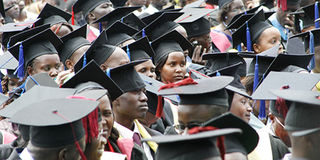Kenya varsity deal to fix admission delays

Graduands at a past graduation ceremony. Some 6,673 students were on Monday admitted to Kenyatta University. Of these, 3,611 are government-sponsored. Photo/FILE
The two-year wait to join public universities could soon be a thing of the past, if a plan prepared by the authorities is implemented.
Students who sat the Kenya Certificate of Secondary Education examination in 2009 and those who did so last year will all be admitted in a double intake before December, according to the plan.
This will come as a major relief for parents, some of whom have resorted to sending their children to privately sponsored programmes to avoid delays in completing courses.
Kenyatta University vice-chancellor Olive Mugenda, who chairs the Joint Admissions Board (Jab), the body that admits students to public universities, said candidates who sat the exam last year will start getting letters of admission in July and report to college from September.
This will break the cycle that started in the 1991/92 academic year after the last A-level class coincided with the first 8-4-4 graduates, creating a delay in admission.
“Under the plan by the seven public universities, students to be selected will know degree programmes and universities they will join this July,” Prof Mugenda said.
Although she did not disclose the number of students to be admitted, the head of Jab noted that it will nearly be double the usual intake.
Flexible academic year
To ease the strain on facilities and academic staff, she said groups will report to the universities in sessions during the academic year. Each degree programme will take four years.
“Universities have agreed to craft a flexible academic year where students shall report for two semesters every academic year,” she said.
But the universities will feel the strain as they will be required to pay lecturers additional remuneration for teaching during their holidays.
According to the University Academic Staff Union data, there are 9,000 lecturers in public and private universities, up from 7,000 four years ago.
During the same period, student enrolment has grown from 91,541 to 180,000.
Prof Mugenda noted that ending the backlog involved coordination of roles played by the Kenya National Examinations Council (Knec), Higher Education Loans Boards (Helb) and Jab in the admission process.
In the new plan, Knec will deliver Form Four results to Jab secretariat immediately they are announced for processing of qualified students and coordination with Helb, which gives loans and bursaries.
“Previously, Knec used to send the results about six months after the release because of remarking complaints, but the cases have been going down substantially,” she said.
Speaking after she welcomed First Year students at Kenyatta University, Prof Mugenda said Helb had been forced to look for alternative sources of funding to ease the crisis.
Some 6,673 students were on Monday admitted to KU. Of these, 3,611 are government-sponsored. Jab had admitted about 24,000 students in 2009.
“There is intense preparation going on so that the backlog can be cleared. Everybody is concerned that students are painfully waiting for too long,” she said.
In many cases, by the time the regular students (government-sponsored) join university, those enrolled under the parallel degree programme are usually gearing up for their third year of study.
“This is a great inequality and as vice-chancellors, we have resolved the backlog has to be eased once and for all,” she added.
Last year, more than 90,000 students attained the minimum university entry grade, C+. The maximum a candidate needs to score the best A mean grade is 84 points.
The first double admission was in 1985 as the government moved to clear a backlog caused by long university closures after the 1982 coup.
The admissions have overtime been blamed for the strain on physical and academic resources that universities are grappling with.
Suspended Higher Education minister William Ruto last year ordered a committee of the vice-chancellors to draw up solutions to end the backlog.
“We are subjecting these students to delays and this committee shall unlock the backlog and give its way forward in two to three weeks’ time,” he said in April last year.
It is not clear at the moment the status of talks where private universities were to be engaged in easing the crisis by admitting 25,000 students in their institutions as regular students.




